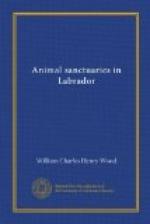First, it cannot be denied that the constant breaking of the present law makes for bad citizenship, and that the observance of law will make for good. Next, though it is often said that what Canada needs most is development and not conservation, I think no one will deny that conservation is the best and most certainly productive form of development in the case before us. Then, I think we have here a really unique opportunity of effecting a reform that will unite and not divide all the legitimate interests concerned. What could appear to have less in common than electricity and sanctuaries? Yet electricity in Labrador requires water-power, which requires a steady flow, which requires a head-water forest, which, in its turn, is admirably fit to shelter wild life. Except for those who would selfishly and shortsightedly take all this wealth of wild life out of the world altogether, in one grasping generation, there is nobody who will not be the better for the change. I have talked with interested parties of every different kind, and always found them agree that conservation is the only thing to do—provided, as they invariably add, that it is done “straight” and “the same for all.”
Fourthly, a word as to sport. I have invoked the public conscience against wanton destruction and its inevitable accompaniment of cruelty. I know, further, that man is generally cruel and a bully towards other animals. And, as an extreme evolutionist, I believe all animals are alike in kind, however much they may differ in degree. But I don’t think clean sport cruel. It does not add to the sum total of cruelty under present conditions. Wild animals shun pain and death as we do. But under Nature they never die what we call natural deaths. They starve or get killed. Moreover, town-bred humanitarians feel pain and death more than the simpler races of men, who, in their turn, feel it more than lower animals. A wild animal that has just escaped death will resume its occupation as if nothing had happened. The sportsman’s clean kill is only an incident in the day’s work, not anxiously apprehended like an operation or a battle. But pain and death are very real, all the same. So death should be inflicted as quickly as possible, even at the risk of losing the rest of one’s bag. And, even beyond the reach of any laws, no animal should ever be killed in sport when its own death might entail the lingering death of its young. A sportsman who observes these rules instinctively, and who never kills what he cannot get and use, is not a cruel man. He certainly is a beast of prey. But so is the most delicate invalid woman when drinking a cup of beef tea. Sport has its use in the development of health and skill and courage. Its practice is one of life’s eternal compromises. And the best thing we can do for it now is to make it clean. We have far too much of the other kind. The essential difference has never been more shrewdly put than in the caustic epigram, that there is the same difference




